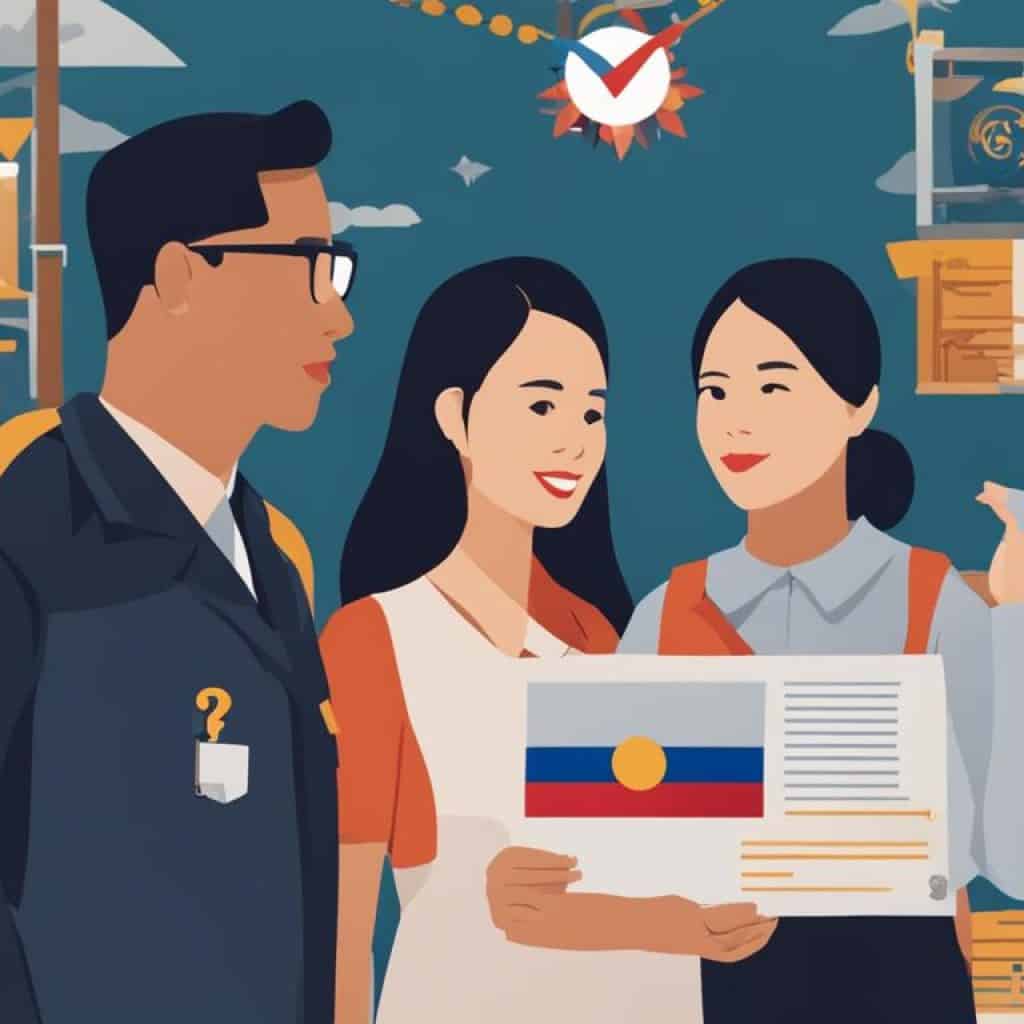Are you married to a Filipina and wondering about your visa status and how long you can stay in the Philippines? This article will provide you with all the information you need regarding visa requirements, immigration rules, and the duration of stay for foreign spouses in the Philippines.
If you are married to a Filipina, you have the opportunity to obtain a 13a Marriage Visa, which allows you to live permanently in the Philippines. This visa is a multiple entry Non-Quota Immigrant Visa type, meaning there is no annual limit on the number of visa applicants. It also grants you permanent residency, allowing you to stay in the Philippines indefinitely, as long as you fulfill the visa requirements and obligations.
To apply for the 13a Marriage Visa, you will need to have a Philippine citizen partner, a valid marriage certificate recognized by the Philippines, and the financial means to support yourself and your family. The application process can take 2-3 months and must be done in your country of residence.
As a permanent resident, it is important to know that you still need to report annually to the Bureau of Immigration and renew your Alien Certificate of Registration Identity Card (ACR-I Card) every five years. This ensures that you maintain your status as a permanent resident in the Philippines.
For more detailed information about the requirements and application process for the 13a Marriage Visa, please refer to the following sections of this article.
Key Takeaways:
- The 13a Marriage Visa allows foreign spouses of Filipino Nationals to live permanently in the Philippines.
- It grants permanent residency and has no annual limit on the number of visa applicants.
- To apply for the 13a Marriage Visa, you need to have a Philippine citizen partner, a valid marriage certificate recognized by the Philippines, and sufficient financial means.
- You must report annually to the Bureau of Immigration and renew your ACR-I Card every five years as a permanent resident.
- Stay tuned for more information about the 13a Marriage Visa requirements, application process, and important terminology.
What is the Philippines 13a visa?
The 13a visa in the Philippines is a marriage visa that allows foreign spouses of Filipino Nationals to live and reside permanently in the country. This visa provides an opportunity for foreign individuals to build a life with their Philippine citizen partner and enjoy the benefits of permanent residency in the Philippines.
The main requirements for the 13a visa are:
- A Philippine citizen partner
- A valid marriage certificate recognized by the Philippines
- Sufficient financial means to support themselves and their family
The 13a visa belongs to the Non-Quota Immigrant Visa category, which means there are no annual restrictions on the number of visa applicants. This visa type provides permanent residency status in the Philippines, allowing foreign spouses to stay indefinitely without the need for additional visa extensions.
With a 13a visa, foreign spouses can enjoy a range of benefits, including the ability to work, start a business, study, and travel freely in and out of the Philippines at their convenience. It offers stability and security in terms of legal status and opens up opportunities for long-term settlement in the country.
“The 13a visa provides a pathway for foreign spouses to fully integrate into Philippine society, participate in the local economy, and establish a fulfilling life alongside their Filipino partner.”
Obtaining a 13a visa requires meeting the eligibility criteria and going through the application process, which involves submitting the necessary documents and fulfilling the financial requirements. The process varies depending on the country of residence, and it is advisable to consult with the Philippine Embassy or Consulate in the respective country for specific guidelines and procedures.
Overall, the 13a visa offers an excellent opportunity for foreign spouses to establish permanent residency in the Philippines, granting them the ability to create a stable and fulfilling life with their Filipino partner.
Key Features of the 13a Visa
| Visa Type | Requirements | Duration of Stay | Visa Category |
|---|---|---|---|
| 13a Visa | Philippine citizen partner, valid marriage certificate, sufficient financial means | Indefinite | Non-Quota Immigrant Visa |
The table above highlights the key features of the 13a visa, including its requirements, duration of stay, and visa category. It showcases the benefits of the 13a visa and emphasizes its significance in providing permanent residency to foreign spouses in the Philippines.
How Long Can I Stay In The Philippines Using The 13a Marriage Visa?
The 13a Permanent marriage visa allows you to stay in the Philippines indefinitely as a permanent resident, unless you divorce or your spouse passes away. As a 13a visa holder, you have the privilege of being able to live and work in the country without any time restrictions. This visa provides you with the opportunity to truly call the Philippines your home.
However, it’s important to note that even as a permanent resident, there are certain requirements that you need to fulfill. You will still need to report annually to the Bureau of Immigration and renew your Alien Certificate of Registration Identity Card (ACR-I Card) every five years. This ensures that your status as a permanent resident remains valid and up to date.
What are the Philippines 13a visa requirements?
To apply for a 13a visa in the Philippines, there are several requirements that you need to fulfill. These requirements are designed to ensure that you are eligible for the visa and meet the necessary criteria. The main requirements for a 13a visa include:
- A Philippine citizen partner: You must be legally married to a Filipino citizen. This can be proven through a valid marriage certificate recognized by the Philippines.
- Sufficient financial means: You need to demonstrate that you have the financial capability to support yourself and your family while living in the Philippines. This can be shown through bank statements, employment contracts, or other financial documents.
In addition to these main requirements, there are some additional documents and checks that may be needed:
- Clean police background check: You may need to provide a police clearance certificate from your home country to show that you have no criminal record.
- Medical examination: You might be required to undergo a medical examination to ensure that you are in good physical condition and mental health.
- Clear criminal record: You may need to submit a clearance from the National Bureau of Investigation (NBI) or a similar agency in your home country to prove that you have no criminal records.
It is important to note that the specific requirements for the 13a visa may vary depending on your country of residence and the Philippine Embassy or Consulate where you apply. Therefore, it is recommended to check with the relevant embassy or consulate for the exact requirements and procedures.
Having a clear understanding of the requirements and gathering all the necessary documents will greatly increase your chances of a successful 13a visa application in the Philippines.
Where Can I Apply for the 13a Marriage Visa?
The 13a visa application process provides convenience through applications being accepted and processed at Philippine Embassies and Consulates in your country of residence. Instead of traveling to the Philippines, you can submit your application closer to home, saving time and money.
Applying for the 13a visa outside the Philippines offers several advantages. It is generally cheaper to apply in your country of residence compared to applying in the Philippines. Additionally, the application process can be more straightforward, with consular officials experienced in processing 13a visa applications.
Each Philippine Embassy or Consulate may have variations in terms of fees, forms, and required documents specific to their location. It is crucial to contact the respective embassy or consulate where you plan to apply to obtain accurate information and ensure a smooth application process.
Applying for the 13a visa outside the Philippines gives you the convenience of obtaining permanent residency while avoiding the need to travel to the country solely for the application process.
The 13a Visa Application Process: A Step-by-Step Guide
- Find the Philippine Embassy or Consulate in your country of residence.
- Contact the embassy or consulate to inquire about the specific requirements and procedures.
- Collect the necessary documents, including your marriage certificate, proof of financial capacity, and any additional forms or paperwork requested by the embassy or consulate.
- Fill out the application forms carefully, ensuring accurate and complete information.
- Submit your application, along with the required documents, and pay the applicable fees.
- Attend any interviews or appointments scheduled by the embassy or consulate.
- Wait for the processing time to receive a decision on your application.
- If approved, receive your 13a visa stamped on your passport.
Applying for the 13a visa in your country of residence provides a convenient and cost-effective option for foreign spouses of Filipino Nationals who wish to live permanently in the Philippines. Take advantage of this opportunity and ensure you follow the specific requirements and procedures set by your local Philippine Embassy or Consulate.

Applying For The 13A Visa In Your Country of Residence
To apply for a 13a visa in your country of residence, the first step is to gather all the necessary documents and complete the application form. Make sure you have the following:
- A valid marriage certificate recognized by the Philippines.
- Proof of financial capacity to support yourself and your family.
- A clear criminal record.
Once you have all the required documents, you can submit your application form along with the supporting documents to the nearest Philippine Embassy or Consulate in your home country. Pay the applicable fees and wait for the processing of your application.
The application process can take around 2-3 months, so it’s important to be patient. During this time, the embassy or consulate will review your application and conduct any necessary background checks. If everything goes smoothly, your 13a visa will be stamped on your passport.
Once you have your 13a visa, you can enter the Philippines as a permanent resident and enjoy all the benefits and privileges that come with it.
| Step | Action |
|---|---|
| 1 | Gather all the necessary documents |
| 2 | Complete the application form |
| 3 | Submit the application form and supporting documents to the Philippine Embassy or Consulate in your country |
| 4 | Pay the applicable fees |
| 5 | Wait for the processing of your application |
| 6 | Receive your 13a visa stamped on your passport |
Important 13a Visa Terminology
The 13a visa in the Philippines is known by different names, including the 13a resident, 13a probationary, and 13a permanent visa. It is specifically designed for foreign spouses of Filipino citizens, allowing them to live and work in the country as permanent residents.
The 13a visa offers foreign spouses the opportunity to build a life in the Philippines alongside their Filipino partners, and it provides them with the necessary legal status to enjoy the rights and privileges of a resident.
It is important to understand that the 13a visa should not be confused with other types of marriage visas in the Philippines. For example, the 13g Marriage Visa is intended for returning former Filipino citizens, while the Temporary Resident’s Visa (TRV) Spousal Visa is applicable to foreign nationals of countries who typically cannot immigrate to the Philippines.
When considering immigration terms related to visa types for foreign spouses in the Philippines, the 13a visa stands out as a unique and valuable option for those looking to establish a long-term presence in the country.

| Visa Type | Purpose | Eligibility Criteria |
|---|---|---|
| 13a Visa | Allows foreign spouses to live permanently in the Philippines | Marriage to a Filipino citizen |
| 13g Marriage Visa | For returning former Filipino citizens | Prior Philippine citizenship |
| Temporary Resident’s Visa (TRV) Spousal Visa | For foreign nationals who cannot usually immigrate to the Philippines | Nationality of country with limitations |
Key Takeaway: 13a Visa Philippines
The 13a Marriage Visa is a valuable opportunity for foreign spouses of Filipino Nationals seeking to establish permanent residency in the Philippines. To be eligible for the 13a visa, applicants must be citizens of specific countries, possess a valid marriage certificate recognized by the Philippines, have a Philippine citizen partner, and demonstrate sufficient financial capacity to support themselves and their family.
Obtaining the 13a visa grants individuals the right to reside in the Philippines indefinitely as permanent residents. The visa does not impose an annual limit on the number of applicants, providing flexibility and accessibility to those who meet the requirements. It is a pathway to establishing a long-term presence in the country without the need for constant visa renewals or the fear of overstaying.
The 13a visa guarantees stability and security, empowering foreign spouses to build a life alongside their Filipino partners. With permanency, individuals are free to pursue various opportunities, including career advancements, business ventures, and personal growth. They can seamlessly integrate into the local community, participate in civic activities, and enjoy the benefits of residing in the beautiful Philippines.
Benefits of the 13a Visa:
- Permanent residency status in the Philippines
- No annual limit on visa applicants
- Freedom to live, work, and study in the country
- Opportunities for personal and professional growth
- Access to healthcare, social services, and education
- Engagement in community activities and events
Living in the Philippines as a permanent resident through the 13a visa offers a sense of belonging and stability. Embrace the beauty and warmth of this remarkable country while enjoying the permanence and freedom provided by the 13a visa.
Whether you dream of exploring the pristine beaches, immersing yourself in the vibrant culture, or starting a successful business, the 13a Marriage Visa enables you to live your best life in the Philippines. Make the most of this extraordinary opportunity and embark on a lifelong journey in this breathtaking archipelago.
FAQs: 13a Non-Quota Immigrant Visa by Marriage
As potential applicants for the 13a visa, you may have several questions about the eligibility criteria, application process, duration of stay, and visa requirements. In this section, we will address the most commonly asked questions regarding the 13a visa, providing you with the information you need to navigate the process successfully.
1. Who is eligible for the 13a visa?
The 13a visa is available to foreign individuals who are married to Filipino citizens. To qualify, you must have a valid marriage certificate recognized by the Philippines, and your financial capacity should be sufficient to support yourself and your family. It is important to note that the 13a visa is limited to citizens of certain countries.
2. What documents are required for the 13a visa application?
When applying for the 13a visa, you will need to submit various documents, including your valid marriage certificate, proof of financial means, and a clean police background check. Additionally, a medical examination certifying your good physical condition and mental health is typically required. Ensuring that you have a clear criminal record is also crucial.
3. How long can I stay in the Philippines with a 13a visa?
With a 13a visa, you can stay in the Philippines indefinitely as a permanent resident, allowing you to enjoy the benefits of living in the country. However, it is important to fulfill the annual reporting requirement to the Bureau of Immigration and renew your Alien Certificate of Registration – Identification (ACR-I Card) every five years.
4. Can I apply for the 13a visa in my home country?
Yes, you can apply for the 13a visa in your home country at the Philippine Embassy or Consulate. It is generally more cost-effective to complete the application process in your home country rather than in the Philippines. However, it is advisable to check the specific requirements and procedures of the Consulate responsible for your jurisdiction.
5. How long does the 13a visa application process take?
The 13a visa application process typically takes around 2-3 months. The processing time may vary depending on the volume of applications and the efficiency of the Consulate. It is crucial to submit all required documents accurately and completely to avoid delays.
6. Can I work in the Philippines with a 13a visa?
Yes, as a permanent resident with a 13a visa, you are allowed to engage in gainful employment in the Philippines. This provides you with the flexibility to pursue professional opportunities and contribute to the local economy.
7. Can I bring my dependents with me on the 13a visa?
Yes, the 13a visa allows for the inclusion of dependents, such as children, under your application. However, it is important to provide the necessary documentation, including birth certificates and proof of financial ability to support your dependents.
8. How often do I need to renew my 13a visa?
Once you are granted a 13a visa, it is generally valid for an indefinite period as long as you maintain your eligibility and comply with the required reporting and renewal obligations. However, it is crucial to renew your ACR-I Card every five years to ensure the validity of your visa status.

With these commonly asked questions about the 13a visa addressed, you now have a better understanding of the eligibility criteria, application process, and requirements involved. Remember to gather the necessary documentation, follow the proper procedures, and seek professional guidance if needed. The 13a visa provides an opportunity for foreign spouses of Filipino citizens to establish permanent residency in the Philippines and build a life together in this beautiful country.
Conclusion
The 13a Marriage Visa is an exceptional opportunity for foreign spouses of Filipino Nationals who desire to establish permanent residency in the Philippines. This visa category enables indefinite stay in the country as a permanent resident, provided that all conditions are met and the visa is renewed as required.
To ensure a smooth and successful application process, it is crucial to carefully follow the prescribed procedures, submit the necessary documents, and comply with all visa regulations. By doing so, applicants can increase their chances of obtaining the 13a Marriage Visa and enjoying the benefits of permanent residency in the Philippines.
Overall, the 13a Marriage Visa offers a sense of stability and security for foreign spouses, allowing them to fully immerse themselves in the culture and society of the Philippines. With its generous provisions and permanency, this visa type is undoubtedly an excellent option for those seeking to build a life together with their Filipino partner in this beautiful country.
FAQ
How long can I stay in the Philippines if I am married to a Filipina?
The 13a Marriage Visa allows foreign spouses of Filipino Nationals to live permanently in the Philippines. As long as the conditions are met and the visa is renewed accordingly, you can stay indefinitely as a permanent resident.
What is the Philippines 13a visa?
The 13a visa is a multiple entry Non-Quota Immigrant Visa type that allows for permanent residency in the Philippines. It is specifically for foreign spouses of Filipino citizens.
How long can I stay in the Philippines using the 13a Marriage Visa?
The 13a Permanent marriage visa allows you to stay in the Philippines indefinitely as a permanent resident, unless you divorce or your spouse passes away. However, even as a permanent resident, you will still need to report annually to the Bureau of Immigration and renew your ACR-I Card every five years.
What are the Philippines 13a visa requirements?
The main requirements for a 13a visa in the Philippines include having a Philippine citizen partner, a valid marriage certificate recognized by the Philippines, and sufficient financial means to support themselves and their family. Additional requirements may include a clean police background check, a medical examination proving good physical condition and mental health, and having a clear criminal record.
Where can I apply for the 13a Marriage Visa?
The 13a visa application process can be done in your country of residence at the Philippine Embassy or Consulate. It is generally cheaper to apply for the 13a visa in your country of residence than in the Philippines. Each Consulate may have slightly different fees, forms, and required documents, so it is important to check with the specific Consulate for the exact application process.
Applying For The 13A Visa In Your Country of Residence
To apply for a 13a visa in your country of residence, you will need to submit the appropriate application form, provide the required supporting documents such as your marriage certificate, proof of financial capacity, and clear criminal record, and pay the applicable fees. The application process may take 2-3 months, and once approved, the visa will be stamped on your passport, allowing you to enter the Philippines as a permanent resident.
Important 13a Visa Terminology
The 13a visa is also referred to as the 13a resident, 13a probationary, and 13a permanent visa. It should not be confused with other types of marriage visas in the Philippines, such as the 13g Marriage Visa for returning former Filipino citizens or the Temporary Resident’s Visa (TRV) Spousal Visa for foreign nationals of countries who cannot usually immigrate to the Philippines.
Key Takeaway: 13a Visa Philippines
The 13a Marriage Visa allows foreign spouses of Filipino Nationals to live permanently in the Philippines. It is a great option for those who wish to stay indefinitely in the country as a permanent resident. It is important to follow the proper application process, provide the required documentation, and comply with the visa regulations to ensure a smooth and successful process.
FAQs: 13a Non-Quota Immigrant Visa by Marriage
Here are some frequently asked questions about the 13a visa:
Q: Can I work in the Philippines with a 13a visa?
Yes, as a permanent resident, you are allowed to work in the Philippines without needing an additional work permit.
Q: Can I leave and re-enter the Philippines with the 13a visa?
Yes, the 13a visa allows for multiple entries, so you can freely leave and re-enter the Philippines.
Q: Can I apply for the 13a visa while in the Philippines?
No, the 13a visa application process must be done in your country of residence at the Philippine Embassy or Consulate.
Q: Can I extend my 13a visa in the Philippines?
No, the 13a visa does not require extensions. As a permanent resident, you only need to renew your ACR-I Card every five years.
Conclusion
The 13a Marriage Visa is a great option for foreign spouses of Filipino Nationals who wish to live permanently in the Philippines. It allows for indefinite stay in the country as a permanent resident, as long as the conditions are met and the visa is renewed accordingly. It is important to follow the proper application process, provide the required documentation, and comply with the visa regulations to ensure a smooth and successful process.







Add comment